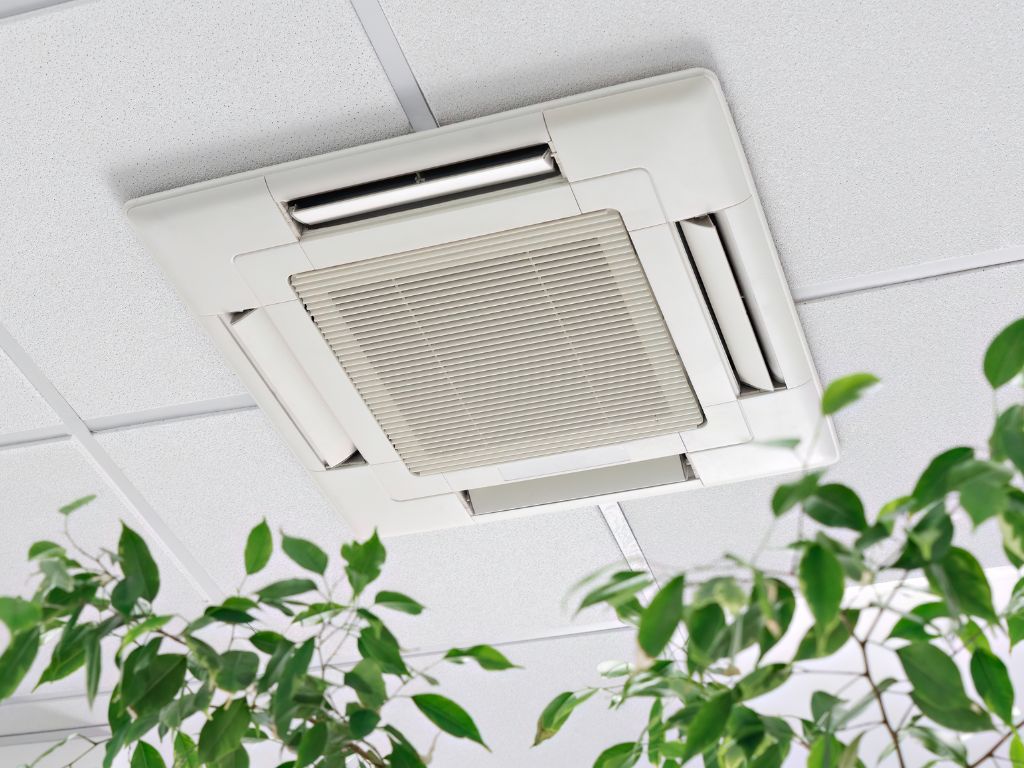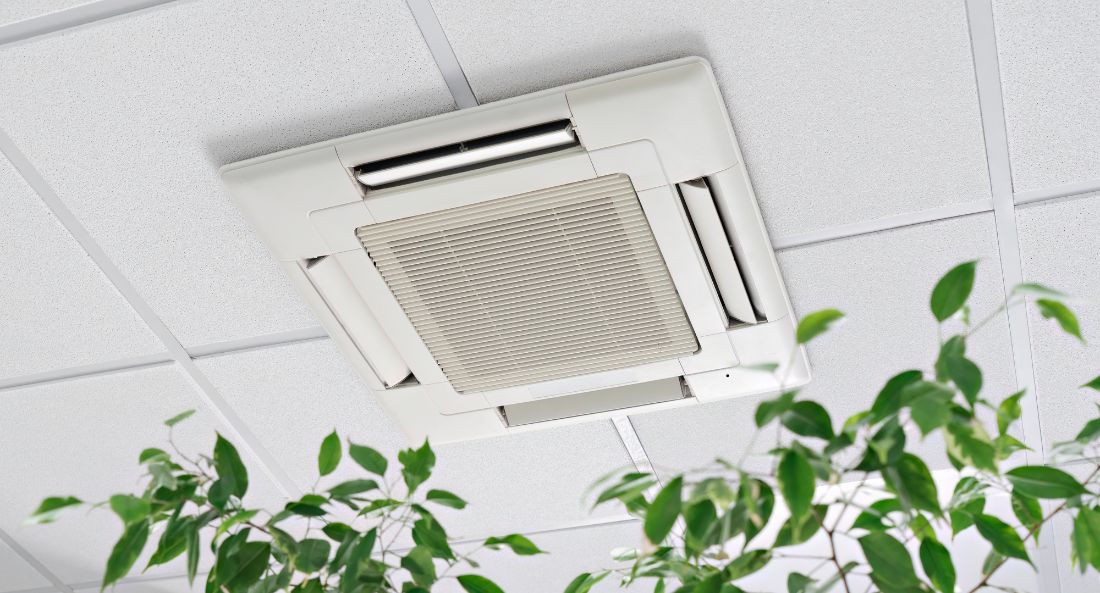
Commercial HVAC systems play an essential role in regulating the indoor climate of businesses and large facilities. These systems ensure that indoor air quality, temperature, and humidity levels are maintained, creating a comfortable environment for both employees and customers. In this guide, we’ll define commercial HVAC, explore how commercial HVAC systems work, how long they typically last, and the importance of regular maintenance in keeping them efficient and reliable.
If your commercial space requires HVAC systems, don’t hesitate to contact us at Cooper Weston. We offer comprehensive HVAC services, including installation, maintenance and repair across Sussex, Surrey and London.
Defining commercial HVAC
Commercial HVAC refers to heating, ventilation, and air conditioning systems designed to regulate the temperature, humidity, and air quality in larger spaces such as offices, factories, retail stores, and other commercial properties. These systems are crucial for maintaining a comfortable indoor environment by controlling airflow, ensuring adequate heating and cooling, and removing excess humidity.
The importance of commercial HVAC goes beyond comfort. A well-functioning system directly impacts productivity, as employees work more effectively in a stable environment. Efficient HVAC systems also help businesses save on energy costs while improving air quality, contributing to the overall health and well-being of those using the space.
How commercial HVAC systems work
Commercial HVAC systems have three main components: heating, ventilation, and air conditioning. Together, these elements regulate temperature, humidity, and air quality in large spaces.
- Heating: This is typically provided by a furnace or boiler, which heats air or water to circulate warmth throughout the building via ducts or radiators.
- Ventilation: Ventilation systems use air ducts to circulate fresh air from the outside while expelling stale air. This process helps maintain air quality and control indoor humidity levels.
- Air conditioning: The cooling unit or air conditioner removes heat from the indoor environment, circulating cool air through the duct system to maintain a comfortable temperature.
The way these components work together depends on the building’s size and type. In large spaces, HVAC systems are often centralised, meaning a single system serves the entire facility. In smaller buildings, split systems may be used, with separate units for different areas to control temperature and airflow more precisely. These systems are designed to ensure consistent indoor climate control, regardless of the building’s size or layout.
How long do commercial HVAC systems last?
The average lifespan of commercial HVAC systems is typically between 15 to 20 years, depending on several key factors.
- Usage patterns: Systems that operate continuously or in demanding environments tend to wear out faster than those with lighter usage.
- Quality of installation: Proper installation by experienced professionals can significantly influence the system’s durability. Poor installation may lead to premature issues and breakdowns.
- Climate conditions: Harsh climates with extreme temperatures or high humidity levels can put extra strain on HVAC systems, affecting their longevity.
Regular maintenance should also be factored in, as it can extend the life of a commercial HVAC system.
Commercial HVAC maintenance
Regular commercial HVAC maintenance is crucial for ensuring the efficiency and longevity of HVAC systems. Routine maintenance helps prevent unexpected breakdowns, maintains optimal performance, and prolongs the system’s life, making it a cost-effective practice for businesses.
Key maintenance tasks include:
- Cleaning filters to prevent blockages and improve airflow.
- Checking refrigerant levels to ensure proper cooling and energy efficiency.
- Inspecting components like coils, fans, and electrical connections to detect wear and tear early.
- Ensuring proper airflow by checking vents and ducts for any obstructions.
Preventive maintenance has numerous benefits. It helps reduce energy costs by ensuring the system runs efficiently, avoids expensive breakdowns by catching small issues before they escalate, and extends the system’s lifespan, saving businesses from premature replacements.
Regular maintenance also improves indoor air quality and keeps the indoor environment comfortable year-round.
Our planned preventative maintenance services
Signs it’s time to replace a commercial HVAC system
Knowing when to replace your commercial HVAC system is key to avoiding excessive costs and maintaining a comfortable environment. Here are some indicators that it may be time for a replacement:
- Inconsistent temperatures: If some areas of your building are too hot or too cold, your commercial system may no longer distribute air evenly, signalling a potential failure.
- Frequent repairs: Repeated breakdowns and repair costs can quickly add up. If your HVAC system constantly needs fixes, investing in a new unit may be more cost-effective.
- Increased energy bills: A sudden or consistent rise in energy costs often indicates that your system is working harder than it should, typically due to inefficiency or age.
It’s also important to consider upgrading if your system is nearing or exceeding its expected lifespan of 15-20 years. Even if it’s still functioning, an older system is likely less energy-efficient and prone to future breakdowns. Replacing it with a modern, energy-efficient system can save money in the long run and improve performance.
HVAC installation and maintenance with Cooper Weston
Understanding how commercial HVAC systems work, their expected lifespan and the importance of regular maintenance is essential for ensuring a comfortable and efficient workplace. Proper design and installation can maximise system performance, while regular maintenance helps extend the lifespan of your HVAC system, reducing breakdowns and keeping energy costs in check.
At Cooper Weston, our professionals specialise in commercial HVAC installation, maintenance, repairs, and system replacements, ensuring your system runs smoothly year-round. Whether you need a new installation or ongoing maintenance to keep your system efficient, our experts are here to help.
Contact us today for tailored HVAC services or to discuss a maintenance plan that meets your business needs and ensures long-lasting performance for your commercial space.
Commercial HVAC systems FAQ
How does a commercial HVAC system differ from a residential system?
Commercial HVAC systems are larger, more powerful, and designed to handle bigger spaces like offices and factories, while residential systems are smaller and more straightforward. Commercial units often have modular designs for flexibility, require more advanced controls, and are built for continuous use, whereas residential systems are typically standalone and used intermittently. Commercial systems also need more specialised maintenance and installation.
What factors influence the cost of installing a commercial HVAC system?
Several factors influence the installation costs of a commercial HVAC system, including:
- Building size: Larger buildings require more extensive systems and ductwork.
- Type of system: The complexity and type (e.g. split systems, rooftop units) affect cost.
- Energy efficiency: High-efficiency systems typically cost more upfront but save money over time.
- Customisation: Systems tailored to specific needs, such as zoning or specialised controls, can increase costs.
- Installation complexity: The layout of the building and ease of access for installation can also impact the price.
Can a commercial HVAC system be customised for specific building needs?
Yes, commercial HVAC systems can be customised to meet specific building needs. Customisation options include zoning to control temperatures in different areas, advanced control systems for managing airflow, humidity, and temperature, and choosing the right heating and cooling capacities based on the building’s size and usage. Energy-efficient upgrades, air quality enhancements, and tailored ductwork can further personalise the system to fit a commercial space’s unique requirements.
What types of buildings require commercial HVAC systems?
Commercial HVAC systems are typically required in larger buildings such as offices, retail stores, factories, warehouses, hospitals, schools, hotels, and shopping centres. These buildings have more complex climate control needs, larger spaces to heat or cool, and higher occupancy levels, which makes the systems necessary for efficient temperature regulation and air quality management.







